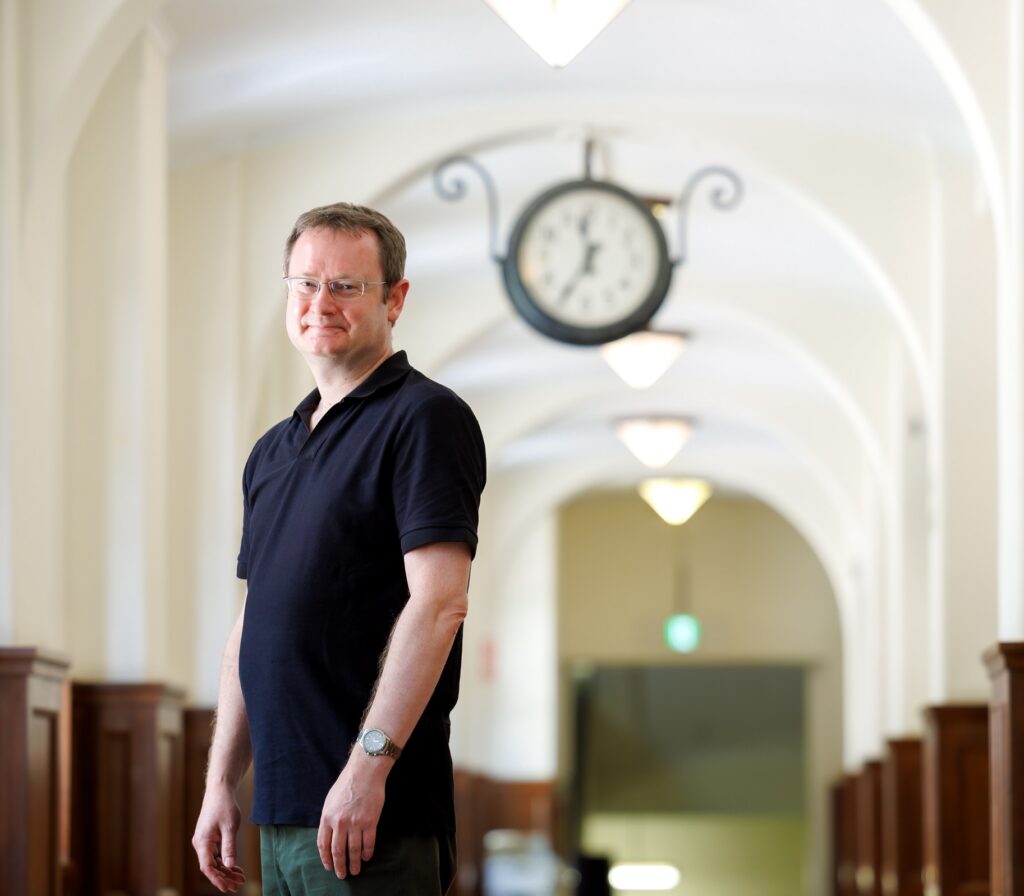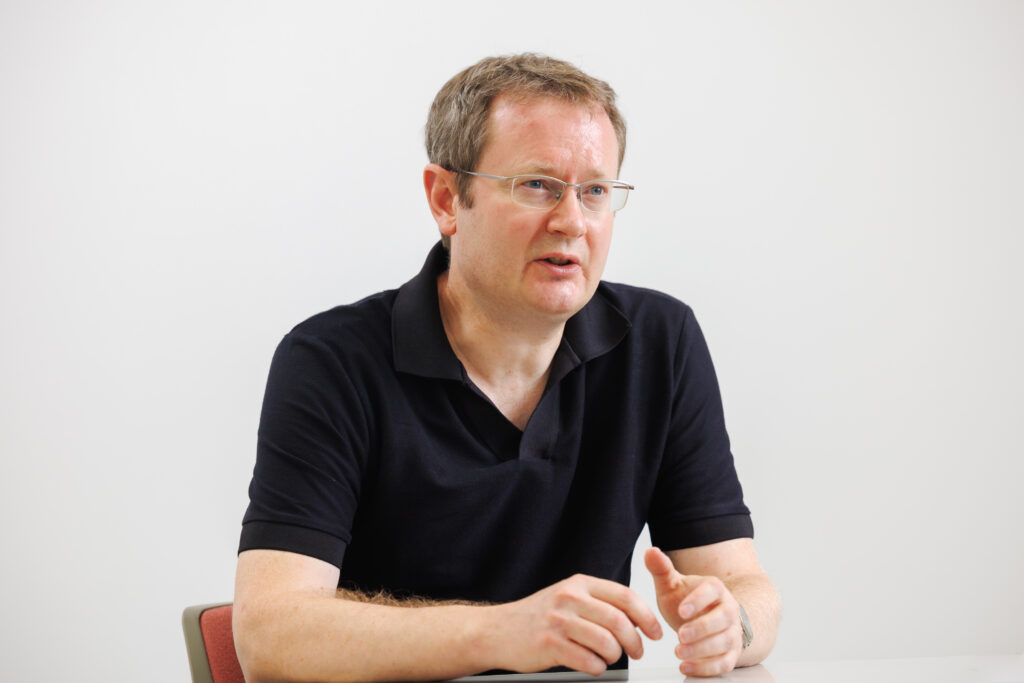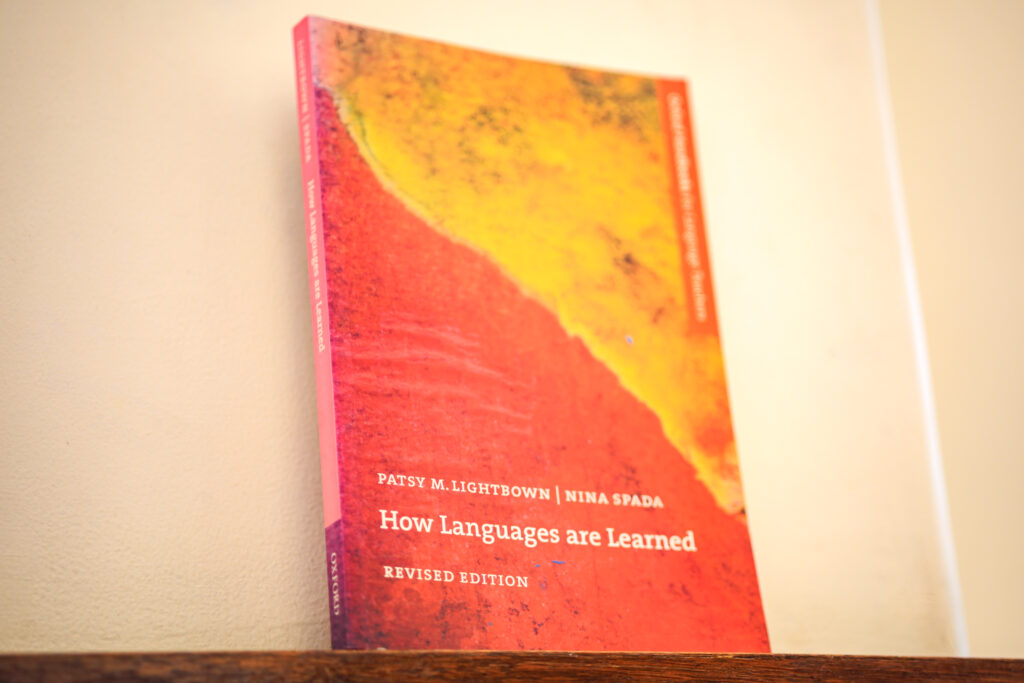
Professor Robert Macintyre of the Faculty of Foreign Studies investigates teaching methods for those learning English as a foreign language. His research involves teaching methods for making academic writing more practical and methods for teaching English language skills that focus on communication. He sees the university classroom as a valuable locus for research activities.
At Sophia University, learning English can take many forms, but the focus of the courses I teach and the subject of my research is academic writing. In order to teach the type of academic language used in essays while also getting students to acquire practical academic writing skills, I do research on the teaching methods that may improve students’ competencies in these areas.
In academic writing, it is important to leave a strong impression on the reader, and the language you use to engage your audience is significant. There is a tendency for academic texts to use extremely lengthy sentences and complex vocabulary so that even native speakers have trouble understanding it without re-reading. However, by acquiring writing patterns, you will be able to write in a way that resonates with readers.
I have created a linguistic corpus—an incredibly large database of sentences—made up of student essays and reports. In analyzing the corpus, I am researching the reasons why and how a writer would choose a certain word or phrase when they want to assert something strongly or express what they feel. In this way, I am seeking insights into improving students’ writing skills and working on the design of teaching methods that further help in that regard. I also test the ideas I derive from my research by actually putting them into practice in the classroom.
Challenges of English education in Japan

In many textbooks that teach academic writing, they make strong claims about things that you should, and should not do. For instance, when writing an essay in English, it is said that you should never use the word “I,” but there are many essays in the real world that use “I” or “I think.” Along the same lines, words and phrases that express the author’s subjectivity such as “surprisingly,” “interestingly,” and “it is important ~” actually are used in high level academic writing.
The fact that there is no continuity between what students learn in high school and what they learn in university is, in my view, one cause of the confusion within English education in Japan. Despite high school students studying English so hard for the type of language required to pass university entrance exams, they are not accustomed to expressing their own opinions in an essay format asked of them by their university teachers. English teaching methods that fill this gap need to be created.
Cultivating theory and praxis
Another of my areas of specialization is Communicative Language Teaching (CLT), which is a second-language teaching approach that places emphasis on increasing communicative competence. Within the department of English studies, I teach and advise students who want to become English teachers. I research the English language teaching methods that I believe they should use as teachers in order to promote the acquisition of practical English communication skills on the part of their future students at junior and senior high schools.
To cultivate teachers who can confidently teach English communication skills, it is vital that the country invest more of the national budget and resources into English education. Currently, there is a lack of preparation time and support for junior and senior high school teachers to learn how to deal with communication-focused teaching materials. When compared in terms of GDP ratio, Japan’s budget for education is the lowest among the G7 countries.
Learning about the theory of English education is completely different from acquiring communication skills that are useful and practical in the classroom. In my teaching, I emphasize teaching methods that lead to effective communication rather than focusing too much on theory. Once enough evidence has been obtained, I want to put together a book that provides a theoretical explanation of CLT for English teaching.
The book I recommend
“How Languages are Learned”
by Patsy M. Lightbown and Nina Spada, Oxford University Press

This book is about how we acquire language. Many academic texts in linguistics are difficult to read, and it was even a struggle for me to get through them as a student. This book explains complicated concepts in simple terms and is a rare book in that it is also a pleasure to read while learning. I also recommend this book for graduate students.
-
Robert Macintyre
- Associate Professor
Department of English
Faculty of Foreign Studies
- Associate Professor
-
As an undergraduate, Robert Macintyre studied history and American studies, writing theses about colonialism, the scramble for Africa, McCarthy, and the Hollywood Ten. After graduating, he worked as a salaryman for 4 years before training to be an English teacher. He subsequently worked in England, Italy, and Japan teaching English to a variety of different age groups. He completed his MEd in Education at Manchester University in 2002, and his PhD in Linguistics at Essex University in the UK in 2015. He first joined Sophia University in 2008.
- Department of English Studies
Interviewed: July 2022